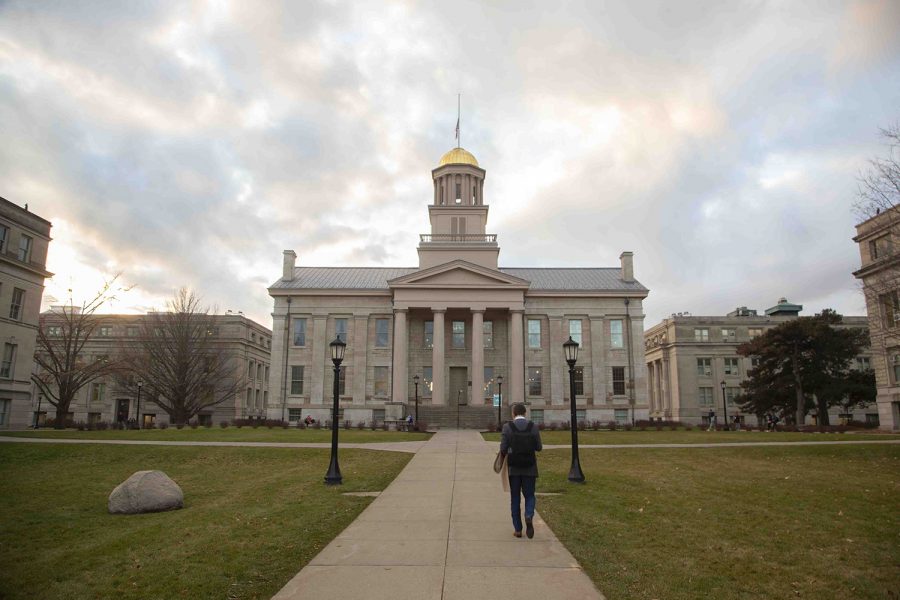Guest Opinion | An open letter to students
Some UI faculty outline their concerns about educating in-person amid the coronavirus and without several of their colleagues in the upcoming fall semester.
July 6, 2020
We’d love to say that we’re eagerly anticipating meeting you this fall, but we have to be honest. We’re scared. We write this on the twelfth consecutive day of new, double-digit COVID-19 cases in Johnson County. We’re scared for our health and yours, and we’re deeply concerned about the direction in which our university is headed.
When you return to the classroom on August 24—whether that classroom is an actual classroom, or your laptop—we need you to understand the backdrop of what’s been going on at our university.
On June 17, the University of Iowa announced its plan for the fall semester. Specifically, all classes of more than 50 people will be held online. Otherwise, we will meet in person. Our university has promised that classes will only be held in classrooms that can accommodate twice the number of students, to allow for safe distancing. We can attest to the fact that those classrooms don’t exist. There aren’t enough classrooms on campus to support that plan, much less space in the hallways and corridors where you’ll be waiting for your classes to begin. All of this violates the CDC’s six-foot social distancing guidelines.
On June 11, several of our colleagues were called into the Dean’s office and unceremoniously fired. In total, fifteen faculty from the College of Liberal Arts and Sciences received similar fates. The only reason they were given was that their contracts were up for renewal, and our university is facing a budget crisis. And so, the Deans, Provost, and President—who each make well over $300,000—have decided to fire instructors who make under $50,000 in order to save money. We worry that a similar fate will befall us when our contract is up for renewal. And, because we’re human, that sense of foreboding will inevitably affect our demeanor. As your public servants, we promise to be mindful of that stress when we walk into the classroom. Our administration has been less mindful.
The same week that faculty lecturers were fired, several departments were informed that they could not fill positions that they had planned to hire, leaving them with far fewer faculty than is necessary, even with decreased enrollment. What does that mean for you? Well, it could mean that your classes will be larger than they should be. Instead of 20 other people, you may be sharing space with 25 or 30 people, an irresponsible move during a global pandemic. Or, it might mean that your already-overworked instructors will be required to teach extra classes with no additional pay. For you, that means less attention, less feedback, and fewer opportunities to meaningfully connect with our incredibly smart and accomplished faculty.
On June 1, the dean of the College of Liberal Arts and Sciences held a virtual town hall to discuss our university’s pandemic preparations. When one faculty member—a self-identified woman of color—expressed concern over returning to the classroom for fear of getting sick, the dean suggested that she get counseling for her anxiety. He said she was expected to return to the classroom in the fall or risk losing her job. That our university “needs her.” Not only did the dean dismiss this lecturer with his language, he also asked a woman of color to sacrifice her body for her job, a glaring injustice given the reality of systemic racism in America.
Many of your instructors are parents of small children. Some have underlying health conditions. Some are cancer survivors or are currently undergoing treatment for serious illnesses. Others are caretakers for elderly parents or partners. None of us can be certain that we won’t bring COVID-19 home, but many of us have nevertheless committed to returning to the classroom. Now, we also face the uncertain fate of our own careers and livelihoods.
Our university identifies smaller classes such as rhetoric and world languages as vital to building a strong foundation for your academic success and as crucial to the “full college experience.” Because of this, your instructors for these classes will be required to teach them in-person as essential academic guides and mentors. The faculty who teach these classes are the lowest-paid, the most vulnerable, and—as the administration has just signaled—the most disposable.
We think Dean Goddard, Provost Fuentes, and President Harreld should go on record to clearly, transparently, and specifically explain why they treat your most essential faculty as their most disposable employees. We are calling on you to join us. Contact Dean Goddard, Provost Fuentes, President Harreld, and others to demand answers about the COVID-19 budget cuts. After all, you pay their salaries, which have yet to be cut at all. If they treat faculty as disposable during this crisis, how will they treat you?
— Lu Ann Dvorak, PhD, LPN, Justin Cosner, Hem Paudel, Wayne Anderson, Kathleen Shaughness, John Sheridan, Patrick Dolan, Dhruba Neupane, Cinda Coggins Mosher, Philip Zaborowski, Bronwyn Stewart, Andrew Cardenas, Sanjna Singh, Elena Carter, Christopher Wei, Callaghan Todhunter, Ian Faith, Dorothy Giannakouros, Ian Shank, Andrea Rochelle Scardina, Brittany Means, Abbi Castle, Dakota Thomas-Wilhelm, Bevin O’Connor, Carrie Schuettpelz, Colin Kostelecky, Brittany Borghi, Anne Sand, Ashley Wells, Will Jennings, Breyan Neyland, Dylan Nice, Stephanie Tsank, Benjamin Hassman



